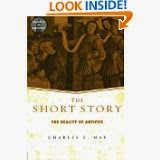Pinckney Benedict, “Mercy” (Miracle Boy and Other Stories)
Sure, this is a simple story. But it is a hard story for me to resist. I tried, but after three readings I gave up and gave it to it.
When I was growing up, I spent a lot of time with my grandfather, who tended a stony farm on the slope of a steep hill in Eastern Kentucky. He was a tough old feller and, like the father in Benedict’s story, never spoke directly to me. I have been thinking about him this spring as I plant tomatoes, Kentucky Pole Beans, potatoes, onions, and squash in whatever plots of soil I can carve out of our narrow Southern California backyard. I hear him say: “If you can’t eat it, no use growing it, no matter how purty you think it is.” Like the father in Benedict’s story, the worst thing my grandfather could say about any thing was that it was “useless.” I cringed when he aimed that epithet at me, spitting tobacco juice at my feet, especially when the accusation was “useless as tits on a boar hog,” the closest thing to poetry he seemed capable of.
I never really understood my grandfather, never really thought he had any inner life, never knew what he loved, or if he loved anything. I never saw any break in his stony approach to reality, never heard him laugh except derisively at somebody. So I liked Benedict’s story, knew from the beginning that it was going to be one of those rare moments when a boy secretly sees a breakthrough in the hard veneer of his father.
I have spent my life teaching short stories to university students, and practically every semester, some of them would whine about how short stories were always such downers, never ending happily. And every semester, I would haul out my old canards about the sloppiness of sentimentality, the toughness of complexity, the slyness of subtlety, etc. etc. The smartest students would nod sagely; the average ones shake their heads sadly.
And while it is true that “feel good” stories that end happily often lapse into the simplistic and the sentimental, the artistic question is whether the happy ending is earned or given away. Sure, “Mercy” illustrates the cliché, “All work and no play….” But I don’t find it a simple illustration. When a man makes a living off the lives of animals, he can’t give them names. When they are Angus cattle, they cannot be seen as more than huge slabs of flesh—potential steaks, roasts, and Big Macs. But that doesn’t mean that when they are all loaded on the trucks and on their way to the abattoir, the man who raised them has no feelings about it. The boy sees the father’s face go slack and his shoulders slump. “And for a brief instant he stood still, motionless as I had never seen him.”
And those miniature horses! If you have never seen one, take a look at some of the videos on Face Book. Yeah, the comments are all: omg, lol, cute, adorable, etc. But the miniatures seem to exist for no other reason than to play, to gambol, to roll over, to scamper. Less 34 inches high, between 55 and 100 pounds, they are not ponies; they are horses. But horses no bigger than a good-sized dog. You gotta love em. Especially in this story, you do, since their owners neglect them, pen them in, let them go hungry, leave them out in the cold. They want out, want to play. So I like that scene when under the weight of the bunched-up horses, the fence gives way and the posts go over one after another like gunshots. (Harmless gunshots are my favorite kind) And the horses shake off the snow and bound out like great dogs through the gap in the fence and head for the bales of hay. “The scene had the feel of a holiday.”
When the father shows up with the .30-06, the boy knows what is coming; after all the father has said if the horses came over into his land he would shoot them. So for a few moments, the reader is not completely sure if the boy knows what is going to happen. The mare dares to play with the father, just doesn’t know any better, dragging him gently forward until, in the cliché classic comic slapstick bit, “He fell right on his ass in the snow, my old man, the Remington held high above his head.”
So is it a well-earned pleasure when we see that the gun is not loaded and that the father is laughing, or is it a sentimental give away? The thing is, a boy may think he knows his father, but does he really? Sometimes the old man may just feel like playing. Unlikely. But possible. And although in the next minute, life may go back to the way it has always been, it may never quite be the same again. I like a story that ends with an “I’ll be damned” moment. But then, maybe I’m just getting old and soft.
Alyson Hagy, “Oil and Gas” (Ghosts of Wyoming)
This story wears me out, for Hagy absolutely refuses to give me any help by identifying the characters and specifying their connections. I know all the events take place in Campbell County, Wyoming, in and around the town of Gillette. I know the latitude/longitude coordinates of all the characters, except for those in specific buildings, like the emergency room in Gillette and the Red Dawg Bar off route 16 in Clearmont. Hell, I can even locate every one of them on online maps.
But the point of the story seems to be that they are all lost; no matter how close together they are, they miss making connections. The theme is announced emphatically at the end of part 1: “Found and Lost. I’d like to write that up as the damn Wyoming state motto.”
Then there’s the story of the day at the hospital that they lost a patient. Not that he died, but got lost, like misplaced. Lora Van Tassell found the old feller up on Fortification Creek, and while he was being treated for dehydration, he just wandered away.
And then there’s Andy Josling who took a wrong turn in his blue Toyoto 4x4. Phil Triplet saw him turn around, “just another fool that got hisself lost on these roads.”
And Prentiss just wandered away from his crew when their rig broke down, and no one has seen him since.
It’s all just another day in “Wild, Wonderful Wyoming—the last place in America to get ahead, except the getting don’t last.”
But then in the last section of the story, two people actually find each other: Lora and Andy are having a five-hour lunch at Debbie’s Restaurant. Neither is young, but Phil Triplet is full of admiration for the “sheer balls” it took Andy to stop looking over his shoulder and to move ahead. “I’d pay a lot to be able to see a good road into the future…. make sure it’s not another backbreaking mirage. A real future. Goddamn.”
I kinda liked this story after I got over being aggravated by it. On the one hand, it seems too much like a show-off indie film in which we are given several separate episodes that finally come together at the end if we work at it hard enough—a Hagy tour-de-force of monologue and dialogue capturing voices that ring true. On the other hand, it seems like a significant effort to capture something about being lost in the changing world of Wyoming, even while you are at home there, because no matter how big the sky is, the earth seems to be altering.
Wednesday, May 19, 2010
Subscribe to:
Post Comments (Atom)





No comments:
Post a Comment